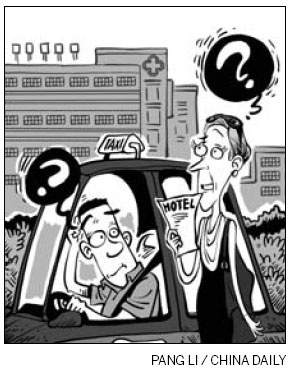Not all that lost in translation
By Karyn Piechule ( China Daily ) Updated: 2010-07-21 10:06:36
After a 13-hour flight from the United States, I arrived in Beijing starry-eyed, excited, and slightly jet-lagged. After making my way through Customs and taking a short subway ride to baggage claim, I dreaded the next mission of finding a taxi.

Having taken only one taxi ride before in my entire life, it was not comforting to know I had to use one abroad - the thought frightened me. Armed with my "instant Chinese" dictionary, and a little bit of courage, I was as ready as I would be.
Outside of the Beijing Capital International Airport, it seemed easy to select a taxi out of the swarm that was located in the parking lot. However, after showing not one, not two, but four taxi drivers the address of my hotel, I was declined a ride by all. They did not understand what I was saying or the address of the hotel that was written on paper.
My proclaimed instant Chinese dictionary had failed me and I believed then that the language barrier was going to be more difficult than I had imagined.
I gave it one more shot and went up to my fifth potential driver and showed him the address. He nodded, allowed me in his cab and we were off.
"That wasn't so bad," I thought to myself. Unfortunately, little did I know that once again, the language barrier would come back to haunt me.
After what seemed like an eternal cab ride and almost 100 yuan ($14.8) later, I was dropped off in front of the Beijing Chaoyang Hospital. My hotel, which featured a large, skinny tower, was nowhere in sight. I begged the cab driver to look at the address again, but he insisted that this was my final stop and drove away. I stood with two suitcases at my side and had absolutely no sense of which direction I was supposed to go. The language barrier, and my dictionary, had again failed me.
I did eventually find my hotel, but for the 30 seconds that I stood outside the massive hospital, I was convinced that I would be helpless. I would never find my way around and I would not be able to speak to anyone or ask for any sort of help during my six-week stay in Beijing, I thought.

But, within the first four days I came to realize how wrong I was. The language barrier was nothing to fear - it was more something to embrace, to take on as a challenge. I put my "not-so-instant" dictionary aside, and found things to be easier than I thought.
While at Sanlitun a calculator was the main means of communication as I tried to bargain with a saleswoman for a designer shirt. On the street, I have fearlessly gone up to people walking by and asked for directions.
When verbal communication is too hard, pulling out a map and pointing out directions has usually worked. At the subway station one night, a man - who could see I was struggling to buy a ticket at the electronic station - tapped me on the shoulder, took my 2 yuan, and proceeded to teach me how to properly buy my ticket home.
While traveling abroad can be overwhelming, having no experience with the language - especially Chinese - is enough to scare some away. But, although I won't ditch the dictionary altogether (or want to be dropped off in the wrong place by a cab again), I no longer fear the language barrier and think of it more as a daily adventure that I am lucky to experience.
|
|
|
|
|
|
|
|


























 Raymond Zhou:
Raymond Zhou: Pauline D Loh:
Pauline D Loh: Hot Pot
Hot Pot Eco China
Eco China China Dream
China Dream China Face
China Face






